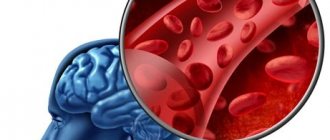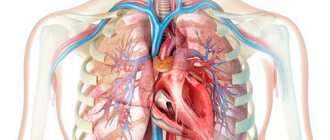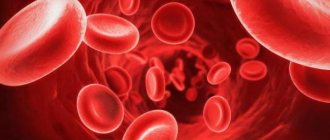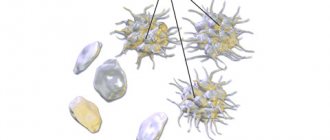How hormonal contraception changes blood clotting
The hormones that make up oral contraceptives (like their natural analogues) work at the genetic level: they penetrate into the nuclei of cells and there directly communicate with DNA - in particular, those parts of the chain that are responsible for blood clotting. Many women will never notice this - but if someone is genetically predetermined to one day experience varicose veins or thrombosis, birth control can bring this moment closer. What do you need to know about your genetics before you start taking the pill?
Since the 1960s, oral contraceptives have been constantly improved. The first drugs contained indecently high, by modern standards, doses of hormones, which is why they quickly gained fame as rather dangerous toys. New generations of tablets are fearlessly used not only for their intended purpose, but also for medicinal purposes. The concentration of active substances in them has decreased by 5–10 times, so noticeable side effects are usually not observed: no sudden weight gain, no decrease in sexual desire, no attacks of insomnia, for which previous generations of OCs were criticized.
But contraceptives also have an invisible front of work: any hormones are needed by the body to solve many problems and cannot specifically perform only one function. For example, progesterone
(it and its analogues are part of oral contraceptives) affects not only ovulation, but also the concentration of blood clotting factors. Nature came up with this to help a woman avoid blood loss during childbirth.
The coagulation system is needed not only for this case: if the vessels are damaged for any reason, it changes the consistency of the blood and turns part of the liquid into a dense clot - a thrombus of protein threads and cells adhered to them, which can be used as a patch.
To prevent the blood from clotting when it is not needed, the system is divided into two camps: coagulation proteins
start the process of blood clot formation, and
anticoagulant proteins
, on the contrary, stop it. Normally, they are in a balanced state: this allows the blood to remain liquid, but at the same time quickly respond to any malfunctions. Disruption of this balance can lead to serious consequences: internal hemorrhages or thrombophilia (increased clotting, due to which blood clots form in unplanned places - for example, among the vessels that supply the brain with oxygen).
In most people, the clotting system regularly experiences pressure:
- due to caffeine, which is found not only in coffee beans and tea leaves, but also in soda cans;
- nicotine coming from tobacco (and hookah tobacco too);
- sports activities, during which water loss inevitably occurs and the blood naturally becomes thicker;
- certain medications (for example, diuretics and fat burners).
The coagulation system can withstand individual blows of fate quite steadfastly, but if negative factors begin to add up, it becomes difficult for the body to thin the blood. At first he will report this with a feeling of heaviness in his legs. Later – varicose veins and hemorrhoids. In the worst case, such disorders will lead to thromboembolism - a sudden blockage of blood vessels in the brain, heart or other organs.
Some people have an imbalanced clotting system from birth. This is due to a slight change in the DNA structure - polymorphisms in genes
, which are called
F2
and
F5
. The F2 gene encodes information about coagulation factor II - prothrombin, a protein precursor that directly affects the formation of the filamentous basis of a blood clot. Due to a genetic failure, too much of it is produced, which means the risk of blood clots increases. The F5 gene encodes coagulation factor V – proaccelerin. A change in the sequence of the gene code makes this protein insensitive to protein C, an anticoagulant that limits excessive blood clotting.
Oral contraceptives affect the same genes: penetrating into the cell nucleus, hormones bind to DNA sections responsible for the production of clotting factors and change them. If, against the background of a genetic breakdown, it is already difficult for the body to maintain balance, the risk of blocking blood vessels with blood clots increases tenfold. Because of this, the World Health Organization calls the prescription of oral contraceptives to women with polymorphisms in the F2 and F5 genes an unacceptable health risk - and this is even without combination with other negative factors.
Polymorphisms in the necessary genes can be identified using tests - DNA does not change with age, so it is enough to take them once in a lifetime. Usually, before prescribing hormonal drugs, gynecologists ask patients to bring the results of such tests to make sure that there are no risks to their health. If for some reason this does not happen, you should check yourself and discuss the results of the study with your doctor. It is especially important to get tested if there are other risk factors:
- Cases of varicose veins, strokes or heart attacks in relatives
- Phlebeurysm
- Smoking
- Regular coffee consumption
- Active physical activity
You can read more about the analysis here.
Instructions Cardiomagnyl
The drug should be used after a doctor's prescription.
ASA can provoke bronchospasm, as well as cause attacks of bronchial asthma and other hypersensitivity reactions. Risk factors include a history of bronchial asthma, hay fever, nasal polyposis, chronic respiratory diseases, and allergic reactions to other drugs (for example, skin reactions, itching, urticaria).
ASA can cause bleeding of varying severity during and after surgery. Several days before planned surgery, the risk of bleeding should be assessed in comparison with the risk of ischemic complications in patients taking low doses of ASA. If the risk of bleeding is significant, ASA should be temporarily discontinued.
The combination of ASA with anticoagulants, thrombolytics and antiplatelet drugs is accompanied by an increased risk of bleeding.
ASA in low doses can trigger the development of gout in predisposed patients (those with reduced excretion of uric acid).
The combination of ASA with methotrexate is accompanied by an increased incidence of side effects from the hematopoietic organs.
High doses of ASA have a hypoglycemic effect, which must be kept in mind when prescribing it to patients with diabetes mellitus receiving oral hypoglycemic agents and insulin.
When using systemic glucocorticosteroids (GCS) and salicylates in combination, it should be remembered that during treatment the concentration of salicylates in the blood is reduced, and after discontinuation of systemic glucocorticosteroids (GCS), an overdose of salicylates is possible.
The combination of ASA with ibuprofen is not recommended in patients with an increased risk of cardiovascular diseases: when used simultaneously with ibuprofen, there is a decrease in the antiplatelet effect of ASA in doses up to 300 mg, which leads to a decrease in the cardioprotective effects of ASA.
Exceeding the dose of ASA above the recommended therapeutic doses is associated with the risk of gastrointestinal bleeding.
With long-term use of low doses of ASA as aggregative therapy, caution must be exercised in elderly patients due to the risk of gastrointestinal bleeding.
When taking ASA simultaneously with alcohol, there is an increased risk of damage to the mucous membrane of the gastrointestinal tract and prolongation of bleeding time.
Types and composition
The drug is presented in pharmacies in two types of tablets:
- heart-shaped with 75 mg of the main substance;
- oval shaped with a notch for ease of dividing into two parts with a dosage of 150 mg.
Each piece is covered with a film shell and contains acetylsalicylic acid as an active ingredient, as well as magnesium hydroxide.
Additional elements are represented by corn starch, talc, cellulose, magnesium stearate, propylene glycol, potato starch.
Cardiomagnyl tablets are packaged in tinted glass jars with a label of 30 or 100 pieces. Manufacturer: Nicomed, Denmark.
How to take Cardiomagnyl tablets
In accordance with the instructions, the tablet can be taken in different ways: swallowed whole, divided into two parts, chewed, crushed or dissolved in water. The best time to take it is at night.
The dosage of Cardiomagnyl is selected depending on the indications. For example, for the initial prevention of thrombosis and heart failure in people at risk, one 150 mg tablet is prescribed on the first day, then Cardiomagnyl 75 mg, one tablet once a day.
To prevent recurrent cases of heart attack or blockage of large vessels by blood clots - one tablet at a dosage of 75-150 mg once a day.
To prevent complications after vascular surgery - one tablet 75-150 mg once a day.
For exacerbations of IHD, one tablet with a dosage of 75-150 mg is prescribed once a day.
The duration of treatment is determined by the doctor individually from one to 6 months. Reception can be continued after a break of 14 to 28 days.
To avoid stomach problems, it is better to take Cardiomagnyl immediately after breakfast.
Traditionally, autumn is the time when all chronic diseases worsen. The gastrointestinal tract is especially sensitive to seasonal changes. Temperature, weather conditions, light conditions change... All this greatly affects a person’s hormonal background and his digestive system. It is not surprising that during the “direct line” with Candidate of Medical Sciences, Associate Professor of the Department of Emergency Surgery of the BelMAPO, curator of the city Center for Gastroduodenal Bleeding at the 10th Clinical Hospital of Minsk Sergei SHOROH, questions from readers of “SB. Belarus today” rained down non-stop.
Get to know yourself better
Maria Budnik: Hello! I have been living with an unpleasant problem for a long time, most likely associated with some kind of gastrointestinal disease. I constantly feel a salty taste in my mouth. Sometimes it is accompanied by a burning sensation. And I’ve been coughing for many years without a cold. What can cause such manifestations? Please advise what should I do about this?
- Most likely, your stomach acidity is impaired. It is also possible that this is a violation of the reflux of acid from the stomach into the esophagus, when it does not close completely. In order not to guess now, you need to conduct examinations. First check the acidity level. And to exclude more serious diagnoses, do an endoscopy of the stomach and duodenum. The fact is that there are pathologies that are not visible on x-rays, but you can see them with your eyes.
Cardiomagnyl®
The drug should be used after a doctor's prescription.
ASA can provoke bronchospasm, as well as cause attacks of bronchial asthma and other hypersensitivity reactions. Risk factors include a history of bronchial asthma, hay fever, nasal polyposis, chronic respiratory diseases, and allergic reactions to other drugs (for example, skin reactions, itching, urticaria).
ASA can cause bleeding of varying severity during and after surgery. Several days before planned surgery, the risk of bleeding should be assessed in comparison with the risk of ischemic complications in patients taking low doses of ASA. If the risk of bleeding is significant, ASA should be temporarily discontinued.
The combination of ASA with anticoagulants, thrombolytics and antiplatelet drugs is accompanied by an increased risk of bleeding.
ASA in low doses can trigger the development of gout in predisposed patients (those with reduced excretion of uric acid).
The combination of ASA with methotrexate is accompanied by an increased incidence of side effects from the hematopoietic organs.
High doses of ASA have a hypoglycemic effect, which must be kept in mind when prescribing it to patients with diabetes mellitus receiving oral hypoglycemic agents and insulin.
When using systemic glucocorticosteroids (GCS) and salicylates in combination, it should be remembered that during treatment the concentration of salicylates in the blood is reduced, and after discontinuation of systemic glucocorticosteroids (GCS), an overdose of salicylates is possible.
The combination of ASA with ibuprofen is not recommended in patients with an increased risk of cardiovascular diseases: when used simultaneously with ibuprofen, there is a decrease in the antiplatelet effect of ASA in doses up to 300 mg, which leads to a decrease in the cardioprotective effects of ASA.
Exceeding the dose of ASA above the recommended therapeutic doses is associated with the risk of gastrointestinal bleeding. With long-term use of low doses of ASA as aggregative therapy, caution must be exercised in elderly patients due to the risk of gastrointestinal bleeding. When taking ASA simultaneously with alcohol, there is an increased risk of damage to the mucous membrane of the gastrointestinal tract and prolongation of bleeding time.
How does Cardiomagnyl work?
The mechanism of action is due to the combined composition. Acetylsalicylic acid has a negative effect on the gastrointestinal mucosa and can lead to peptic ulcers or provoke a relapse of an existing disease. Magnesium hydroxide is a hydrochloric acid neutralizer, added to protect the stomach lining from the aggressive effects of aspirin.
Acetylsalicylic acid is a non-steroidal anti-inflammatory drug that has analgesic and antipyretic effects. The dosage of the substance in Cardiomagnyl allows:
- reduce blood clotting;
- prevent platelet clumping;
- prevents the formation of blood clots in large vessels.









